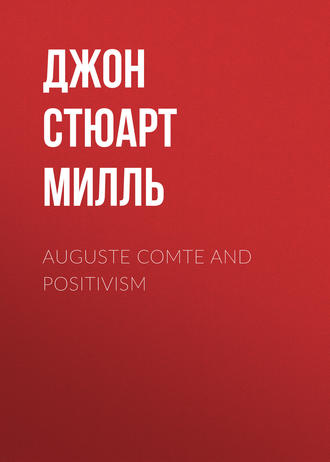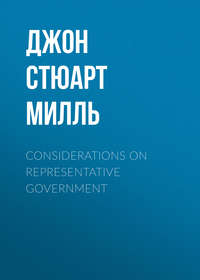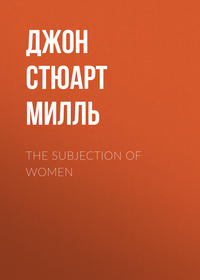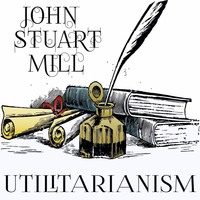 полная версия
полная версияAuguste Comte and Positivism
He assigns only this humble rank to the first of all the articles of the liberal creed, "the absolute right of free examination, or the dogma of unlimited liberty of conscience." As far as this doctrine only means that opinions, and their expression, should be exempt from legal restraint, either in the form of prevention or of penalty, M. Comte is a firm adherent of it: but the moral right of every human being, however ill-prepared by the necessary instruction and discipline, to erect himself into a judge of the most intricate as well as the most important questions that can occupy the human intellect, he resolutely denies. "There is no liberty of conscience," he said in an early work, "in astronomy, in physics, in chemistry, even in physiology, in the sense that every one would think it absurd not to accept in confidence the principles established in those sciences by the competent persons. If it is otherwise in politics, the reason is merely because, the old doctrines having gone by and the new ones not being yet formed, there are not properly, during the interval, any established opinions." When first mankind outgrew the old doctrines, an appeal from doctors and teachers to the outside public was inevitable and indispensable, since without the toleration and encouragement of discussion and criticism from all quarters, it would have been impossible for any new doctrines to grow up. But in itself, the practice of carrying the questions which more than all others require special knowledge and preparation, before the incompetent tribunal of common opinion, is, he contends, radically irrational, and will and ought to cease when once mankind have again made up their minds to a system of doctrine. The prolongation of this provisional state, producing an ever-increasing divergence of opinions, is already, according to him, extremely dangerous, since it is only when there is a tolerable unanimity respecting the rule of life, that a real moral control can be established over the self-interest and passions of individuals. Besides which, when every man is encouraged to believe himself a competent judge of the most difficult social questions, he cannot be prevented from thinking himself competent also to the most important public duties, and the baneful competition for power and official functions spreads constantly downwards to a lower and lower grade of intelligence. In M. Comte's opinion, the peculiarly complicated nature of sociological studies, and the great amount of previous knowledge and intellectual discipline requisite for them, together with the serious consequences that may be produced by even, temporary errors on such subjects, render it necessary in the case of ethics and politics, still more than of mathematics and physics, that whatever legal liberty may exist of questioning and discussing, the opinions of mankind should really be formed for them by an exceedingly small number of minds of the highest class, trained to the task by the most thorough and laborious mental preparation: and that the questioning of their conclusions by any one, not of an equivalent grade of intellect and instruction, should be accounted equally presumptuous, and more blamable, than the attempts occasionally made by sciolists to refute the Newtonian astronomy. All this is, in a sense, true: but we confess our sympathy with those who feel towards it like the man in the story, who being asked whether he admitted that six and five make eleven, refused to give an answer until he knew what use was to be made of it. The doctrine is one of a class of truths which, unless completed by other truths, are so liable to perversion, that we may fairly decline to take notice of them except in connexion with some definite application. In justice to M. Comte it should be said that he does not wish this intellectual dominion to be exercised over an ignorant people. Par from him is the thought of promoting the allegiance of the mass to scientific authority by withholding from them scientific knowledge. He holds it the duty of society to bestow on every one who grows up to manhood or womanhood as complete a course of instruction in every department of science, from mathematics to sociology, as can possibly be made general: and his ideas of what is possible in that respect are carried to a length to which few are prepared to follow him. There is something startling, though, when closely looked into, not Utopian or chimerical, in the amount of positive knowledge of the most varied kind which he believes may, by good methods of teaching, be made the common inheritance of all persons with ordinary faculties who are born into the world: not the mere knowledge of results, to which, except for the practical arts, he attaches only secondary value, but knowledge also of the mode in which those results were attained, and the evidence on which they rest, so far as it can be known and understood by those who do not devote their lives to its study.
We have stated thus fully M. Comte's opinion on the most fundamental doctrine of liberalism, because it is the clue to much of his general conception of politics. If his object had only been to exemplify by that doctrine the purely negative character of the principal liberal and revolutionary schools of thought, he need not have gone so far: it would have been enough to say, that the mere liberty to hold and express any creed, cannot itself be that creed. Every one is free to believe and publish that two and two make ten, but the important thing is to know that they make four. M. Comte has no difficulty in making out an equally strong case against the other principal tenets of what he calls the revolutionary school; since all that they generally amount to is, that something ought not to be: which cannot possibly be the whole truth, and which M. Comte, in general, will not admit to be even part of it. Take for instance the doctrine which denies to governments any initiative in social progress, restricting them to the function of preserving order, or in other words keeping the peace: an opinion which, so far as grounded on so-called rights of the individual, he justly regards as purely metaphysical; but does not recognise that it is also widely held as an inference from the laws of human nature and human affairs, and therefore, whether true or false, as a Positive doctrine. Believing with M. Comte that there are no absolute truths in the political art, nor indeed in any art whatever, we agree with him that the laisser faire doctrine, stated without large qualifications, is both unpractical and unscientific; but it does not follow that those who assert it are not, nineteen times out of twenty, practically nearer the truth than those who deny it. The doctrine of Equality meets no better fate at M. Comte's hands. He regards it as the erection into an absolute dogma of a mere protest against the inequalities which came down from the middle ages, and answer no legitimate end in modern society. He observes, that mankind in a normal state, having to act together, are necessarily, in practice, organized and classed with some reference to their unequal aptitudes, natural or acquired, which demand that some should be under the direction of others: scrupulous regard being at the same time had to the fulfilment towards all, of "the claims rightfully inherent in the dignity of a human being; the aggregate of which, still very insufficiently appreciated, will constitute more and more the principle of universal morality as applied to daily use… a grand moral obligation, which has never been directly denied since the abolition of slavery" (iv. 51). There is not a word to be said against these doctrines: but the practical question is one which M. Comte never even entertains – viz., when, after being properly educated, people are left to find their places for themselves, do they not spontaneously class themselves in a manner much more conformable to their unequal or dissimilar aptitudes, than governments or social institutions are likely to do it for them? The Sovereignty of the People, again, – that metaphysical axiom which in France and the rest of the Continent has so long been the theoretic basis of radical and democratic politics, – he regards as of a purely negative character, signifying the right of the people to rid themselves by insurrection of a social order that has become oppressive; but, when erected into a positive principle of government, which condemns indefinitely all superiors to "an arbitrary dependence upon the multitude of their inferiors," he considers it as a sort of "transportation to peoples of the divine right so much reproached to kings" (iv. 55, 56). On the doctrine as a metaphysical dogma or an absolute principle, this criticism is just; but there is also a Positive doctrine, without any pretension to being absolute, which claims the direct participation of the governed in their own government, not as a natural right, but as a means to important ends, under the conditions and with the limitations which those ends impose. The general result of M. Comte's criticism on the revolutionary philosophy, is that he deems it not only incapable of aiding the necessary reorganization of society, but a serious impediment thereto, by setting up, on all the great interests of mankind, the mere negation of authority, direction, or organization, as the most perfect state, and the solution of all problems: the extreme point of this aberration being reached by Rousseau and his followers, when they extolled the savage state, as an ideal from which civilization was only a degeneracy, more or less marked and complete.
The state of sociological speculation being such as has been described – divided between a feudal and theological school, now effete, and a democratic and metaphysical one, of no value except for the destruction of the former; the problem, how to render the social science positive, must naturally have presented itself, more or less distinctly, to superior minds. M. Comte examines and criticises, for the most part justly, some of the principal efforts which have been made by individual thinkers for this purpose. But the weak side of his philosophy comes out prominently in his strictures on the only systematic attempt yet made by any body of thinkers, to constitute a science, not indeed of social phenomena generally, but of one great class or division of them. We mean, of course, political economy, which (with a reservation in favour of the speculations of Adam Smith as valuable preparatory studies for science) he deems unscientific, unpositive, and a mere branch of metaphysics, that comprehensive category of condemnation in which he places all attempts at positive science which are not in his opinion directed by a right scientific method. Any one acquainted with the writings of political economists need only read his few pages of animadversions on them (iv. 193 to 205), to learn how extremely superficial M. Comte can sometimes be. He affirms that they have added nothing really new to the original aperçus of Adam Smith; when every one who has read them knows that they have added so much as to have changed the whole aspect of the science, besides rectifying and clearing up in the most essential points the aperçus themselves. He lays an almost puerile stress, for the purpose of disparagement, on the discussions about the meaning of words which are found in the best books on political economy, as if such discussions were not an indispensable accompaniment of the progress of thought, and abundant in the history of every physical science. On the whole question he has but one remark of any value, and that he misapplies; namely, that the study of the conditions of national wealth as a detached subject is unphilosophical, because, all the different aspects of social phaenomena acting and reacting on one another, they cannot be rightly understood apart: which by no means proves that the material and industrial phaenomena of society are not, even by themselves, susceptible of useful generalizations, but only that these generalizations must necessarily be relative to a given form of civilization and a given stage of social advancement. This, we apprehend, is what no political economist would deny. None of them pretend that the laws of wages, profits, values, prices, and the like, set down in their treatises, would be strictly true, or many of them true at all, in the savage state (for example), or in a community composed of masters and slaves. But they do think, with good reason, that whoever understands the political economy of a country with the complicated and manifold civilization of the nations of Europe, can deduce without difficulty the political economy of any other state of society, with the particular circumstances of which he is equally well acquainted.14 We do not pretend that political economy has never been prosecuted or taught in a contracted spirit. As often as a study is cultivated by narrow minds, they will draw from it narrow conclusions. If a political economist is deficient in general knowledge, he will exaggerate the importance and universality of the limited class of truths which he knows. All kinds of scientific men are liable to this imputation, and M. Comte is never weary of urging it against them; reproaching them with their narrowness of mind, the petty scale of their thoughts, their incapacity for large views, and the stupidity of those they occasionally attempt beyond the bounds of their own subjects. Political economists do not deserve these reproaches more than other classes of positive inquirers, but less than most. The principal error of narrowness with which they are frequently chargeable, is that of regarding, not any economical doctrine, but their present experience of mankind, as of universal validity; mistaking temporary or local phases of human character for human nature itself; having no faith in the wonderful pliability of the human mind; deeming it impossible, in spite of the strongest evidence, that the earth can produce human beings of a different type from that which is familiar to them in their own age, or even, perhaps, in their own country. The only security against this narrowness is a liberal mental cultivation, and all it proves is that a person is not likely to be a good political economist who is nothing else.
Thus far, we have had to do with M. Comte, as a sociologist, only in his critical capacity. We have now to deal with him as a constructor – the author of a sociological system. The first question is that of the Method proper to the study. His view of this is highly instructive.
The Method proper to the Science of Society must be, in substance, the same as in all other sciences; the interrogation and interpretation of experience, by the twofold process of Induction and Deduction. But its mode of practising these operations has features of peculiarity. In general, Induction furnishes to science the laws of the elementary facts, from which, when known, those of the complex combinations are thought out deductively: specific observation of complex phaenomena yields no general laws, or only empirical ones; its scientific function is to verify the laws obtained by deduction. This mode of philosophizing is not adequate to the exigencies of sociological investigation. In social phaemomena the elementary facts are feelings and actions, and the laws of these are the laws of human nature, social facts being the results of human acts and situations. Since, then, the phaenomena of man in society result from his nature as an individual being, it might be thought that the proper mode of constructing a positive Social Science must be by deducing it from the general laws of human nature, using the facts of history merely for verification. Such, accordingly, has been the conception of social science by many of those who have endeavoured to render it positive, particularly by the school of Bentham. M. Comte considers this as an error. We may, he says, draw from the universal laws of human nature some conclusions (though even these, we think, rather precarious) concerning the very earliest stages of human progress, of which there are either no, or very imperfect, historical records. But as society proceeds in its development, its phaenomena are determined, more and more, not by the simple tendencies of universal human nature, but by the accumulated influence of past generations over the present. The human beings themselves, on the laws of whose nature the facts of history depend, are not abstract or universal but historical human beings, already shaped, and made what they are, by human society. This being the case, no powers of deduction could enable any one, starting from the mere conception of the Being Man, placed in a world such as the earth may have been before the commencement of human agency, to predict and calculate the phaenomena of his development such as they have in fact proved. If the facts of history, empirically considered, had not given rise to any generalizations, a deductive study of history could never have reached higher than more or less plausible conjecture. By good fortune (for the case might easily have been otherwise) the history of our species, looked at as a comprehensive whole, does exhibit a determinate course, a certain order of development: though history alone cannot prove this to be a necessary law, as distinguished from a temporary accident. Here, therefore, begins the office of Biology (or, as we should say, of Psychology) in the social science. The universal laws of human nature are part of the data of sociology, but in using them we must reverse the method of the deductive physical sciences: for while, in these, specific experience commonly serves to verify laws arrived at by deduction, in sociology it is specific experience which suggests the laws, and deduction which verifies them. If a sociological theory, collected from historical evidence, contradicts the established general laws of human nature; if (to use M. Comte's instances) it implies, in the mass of mankind, any very decided natural bent, either in a good or in a bad direction; if it supposes that the reason, in average human beings, predominates over the desires, or the disinterested desires over the personal; we may know that history has been misinterpreted, and that the theory is false. On the other hand, if laws of social phaenomena, empirically generalized from history, can when once suggested be affiliated to the known laws of human nature; if the direction actually taken by the developments and changes of human society, can be seen to be such as the properties of man and of his dwelling-place made antecedently probable, the empirical generalizations are raised into positive laws, and Sociology becomes a science.
Much has been said and written for centuries past, by the practical or empirical school of politicians, in condemnation of theories founded on principles of human nature, without an historical basis; and the theorists, in their turn, have successfully retaliated on the practicalists. But we know not any thinker who, before M. Comte, had penetrated to the philosophy of the matter, and placed the necessity of historical studies as the foundation of sociological speculation on the true footing. From this time any political thinker who fancies himself able to dispense with a connected view of the great facts of history, as a chain of causes and effects, must be regarded as below the level of the age; while the vulgar mode of using history, by looking in it for parallel cases, as if any cases were parallel, or as if a single instance, or even many instances not compared and analysed, could reveal a law, will be more than ever, and irrevocably, discredited.
The inversion of the ordinary relation between Deduction and Induction is not the only point in which, according to M. Comte, the Method proper to Sociology differs from that of the sciences of inorganic nature. The common order of science proceeds from the details to the whole. The method of Sociology should proceed from the whole to the details. There is no universal principle for the order of study, but that of proceeding from the known to the unknown; finding our way to the facts at whatever point is most open to our observation. In the phaenomena of the social state, the collective phaenomenon is more accessible to us than the parts of which it is composed. This is already, in a great degree, true of the mere animal body. It is essential to the idea of an organism, and it is even more true of the social organism than of the individual. The state of every part of the social whole at any time, is intimately connected with the contemporaneous state of all the others. Religious belief, philosophy, science, the fine arts, the industrial arts, commerce, navigation, government, all are in close mutual dependence on one another, insomuch that when any considerable change takes place in one, we may know that a parallel change in all the others has preceded or will follow it. The progress of society from one general state to another is not an aggregate of partial changes, but the product of a single impulse, acting through all the partial agencies, and can therefore be most easily traced by studying them together. Could it even be detected in them separately, its true nature could not be understood except by examining them in the ensemble. In constructing, therefore, a theory of society, all the different aspects of the social organization must be taken into consideration at once.
Our space is not consistent with inquiring into all the limitations of this doctrine. It requires many of which M. Comte's theory takes no account. There is one, in particular, dependent on a scientific artifice familiar to students of science, especially of the applications of mathematics to the study of nature. When an effect depends on several variable conditions, some of which change less, or more slowly, than others, we are often able to determine, either by reasoning or by experiment, what would be the law of variation of the effect if its changes depended only on some of the conditions, the remainder being supposed constant. The law so found will be sufficiently near the truth for all times and places in which the latter set of conditions do not vary greatly, and will be a basis to set out from when it becomes necessary to allow for the variations of those conditions also. Most of the conclusions of social science applicable to practical use are of this description. M. Comte's system makes no room for them. We have seen how he deals with the part of them which are the most scientific in character, the generalizations of political economy.
There is one more point in the general philosophy of sociology requiring notice. Social phaenomena, like all others, present two aspects, the statical, and the dynamical; the phaenomena of equilibrium, and those of motion. The statical aspect is that of the laws of social existence, considered abstractedly from progress, and confined to what is common to the progressive and the stationary state. The dynamical aspect is that of social progress. The statics of society is the study of the conditions of existence and permanence of the social state. The dynamics studies the laws of its evolution. The first is the theory of the consensus, or interdependence of social phaenomena. The second is the theory of their filiation.
The first division M. Comte, in his great work, treats in a much more summary manner than the second; and it forms, to our thinking, the weakest part of the treatise. He can hardly have seemed even to himself to have originated, in the statics of society, anything new,15 unless his revival of the Catholic idea of a Spiritual Power may be so considered. The remainder, with the exception of detached thoughts, in which even his feeblest productions are always rich, is trite, while in our judgment far from being always true.
He begins by a statement of the general properties of human nature which make social existence possible. Man has a spontaneous propensity to the society of his fellow-beings, and seeks it instinctively, for its own sake, and not out of regard to the advantages it procures for him, which, in many conditions of humanity, must appear to him very problematical. Man has also a certain, though moderate, amount of natural benevolence. On the other hand, these social propensities are by nature weaker than his selfish ones; and the social state, being mainly kept in existence through the former, involves an habitual antagonism between the two. Further, our wants of all kinds, from the purely organic upwards, can only be satisfied by means of labour, nor does bodily labour suffice, without the guidance of intelligence. But labour, especially when prolonged and monotonous, is naturally hateful, and mental labour the most irksome of all; and hence a second antagonism, which must exist in all societies whatever. The character of the society is principally determined by the degree in which the better incentive, in each of these cases, makes head against the worse. In both the points, human nature is capable of great amelioration. The social instincts may approximate much nearer to the strength of the personal ones, though never entirely coming up to it; the aversion to labour in general, and to intellectual labour in particular, may be much weakened, and the predominance of the inclinations over the reason greatly diminished, though never completely destroyed. The spirit of improvement results from the increasing strength of the social instincts, combined with the growth of an intellectual activity, which guiding the personal propensities, inspires each individual with a deliberate desire to improve his condition. The personal instincts left to their own guidance, and the indolence and apathy natural to mankind, are the sources which mainly feed the spirit of Conservation. The struggle between the two spirits is an universal incident of the social state.









